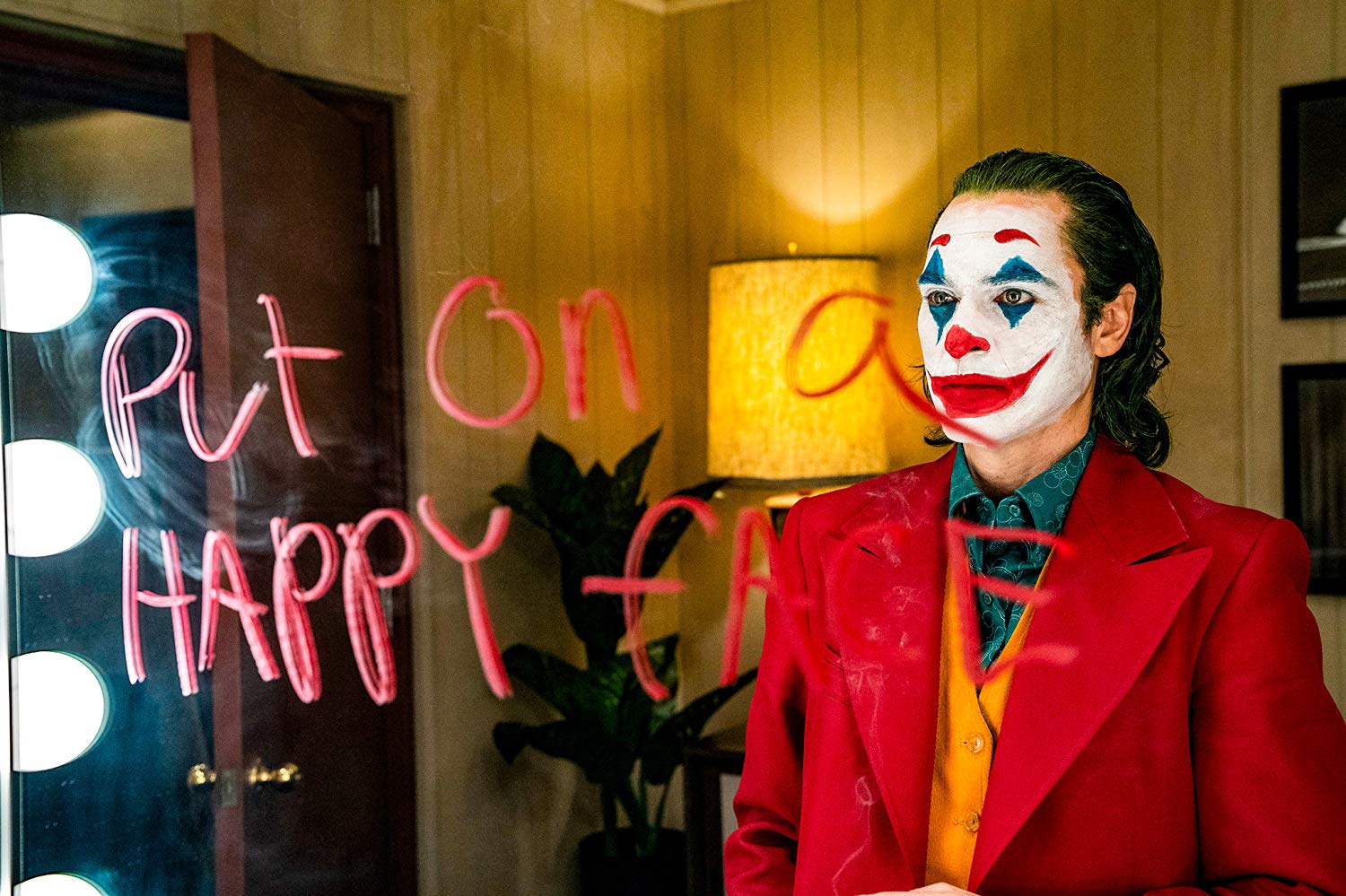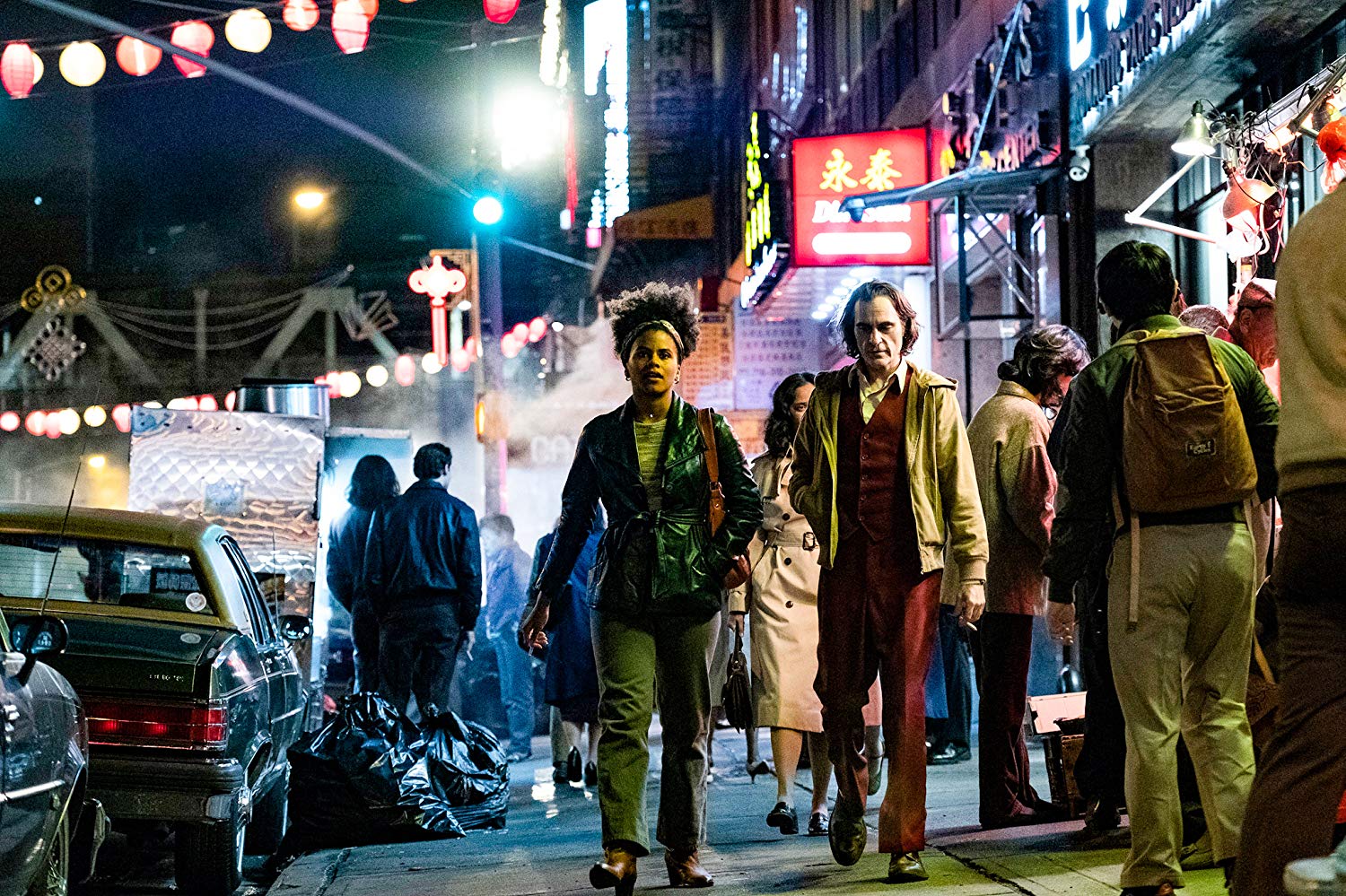Basically: A dumbfounding misery parade featuring the rise of a Trump Era Joker.
Before we begin, let’s take time for a few special announcements. First, I am a DC Comics girl. I say “girl” because I’ve adored DC’s Big Three since birth. Second, I had to wait 36 hours before I could write this review. It’s almost as though I went through the three stages of comic book movie grief: dumbfounded, lip-curling anger, and acceptance that “gritty” is an expletive.
Your superpowers of perception are probably telling you where this is going but let’s get into it: A villain is a very specific thing. They may fall into the category of antagonist but they are far more specialized. They are the flipside of your hero, not just a foil but a mirror image. They are the hero’s reminder that “there but for the grace of God…” Villains are meant to be wrong. Sometimes empathized with, sometimes correct in theory but ultimately wrong in their ideology, methodology, or both. That is their glory. And their purpose… Sup, Killmonger? Oh hey, Heisenberg.
…and that understanding is something Joker, the film, doesn’t have.

Photo © Warner Bros. Pictures
From director Todd Phillips, who co-wrote with Scott Silver, Joker is a technically solid film. Visually lush, strong performances, narrative pull, and a soundtrack that’s a banger. Sounds good, right? Nah. All of that is the problem. It is so easy to get pulled in by the spectacle of it all—the marionette like contortions and hypnotizing swagger of Joaquin Phoenix—that you’d easily miss what’s wrong with this movie is it’s telling us The Joker isn’t. This is a mass shooter headline (droning on about loners and the cruelness of society) made into an equally apologist film. Well crafted? Sure. Misleading and irresponsible? Yes.
Envision a misguided remix of Taxi Driver (1976), V for Vendetta (comic), and Batman (1989). Got it? That’s the story, folx. I could set it up with more detail but never more clearly. In continuance of that misguided part, this movie attempts to justify The Joker’s murderous madness and then turns him into a folk hero. And it blames us for everything he does to make Gotham burn. Basically you’re meant to applaud him. Some may call it social commentary but rather than reflect society’s ills, Joker condones its villain.
Arthur Fleck (Phoenix) is a down on his luck clown who is living with a disability, mental illness, and PTSD. He’s a loner. That quiet guy in your neighborhood / office / school who makes you uncomfortable but also makes you feel guilty about it—maybe because he takes care of his slightly dotty mother. Arthur has dreams of becoming a comedian but not even his mom thinks he’s funny. Yes, he’s socially awkward but he seems like a good guy, right? From the start Arthur is painted as doing his best, but a group of brown kids beat him up for no reason*, an angry black mother yells at him for no reason, no one wants to sleep with him, and his black woman therapist doesn’t listen. No one ever listens. Sound familiar? That’s where those headlines we talked about come in. Or as Jon Dieringer from Screen Slate wrote “[the] emotional intelligence of a school shooter manifesto.” Well said.

Photo © Warner Bros. Pictures
And then one day Arthur is “emancipated” by committing murder—actually a mass shooting (I’m not kidding) —and his journey to becoming the clown prince of crime begins.
To summarize: This movie is the diary of a lone gunman, but JOKER‘s message has nothing to do with body count. It’s about the context and the framing of the character—not the character’s actions but how the filmmakers want you to feel about those actions. What’s horrifying is they want you to feel good about it. This character is emancipated by mass murder and homicide. AND the filmmakers want you to believe he’s justified—they’ve decided you should rally behind him, and accept that it’s all your fault.
(edited Sun Oct 6)
There are no counterpoints or condemnation of the character. Joker is not commentary; it’s condoning. It is also filled with egregious vilification of disability and criminalization of mental illness (admittedly a fault of the Batman universe at large). Oh, and the women. The women are flat out refrigerated—deep freeze—used as props like action figures for Joker to play with and to punish. Zazie Beetz and Frances Conroy do their best but Joker doesn’t serve them. And THEN it tries to give this “joker” the credit for shaping Gotham (and even Batman himself).
The filmmakers are serving us a cesspool in a soup bowl but rather than say smell that, it’s bad they hand us a spoon and scream dig in. That’s what makes this film so insidious, the “Joker” movie might be a far bigger villain than the Joker ever was. Either that or the movie is Keyser Söze—Joaquin Phoenix’s performance is so good, it’ll convince you this evil doesn’t exist.
(edited Sun Oct 6)
In the End: I get it, if you’re just watching it for the spectacle or you’re purely enamored with how different it is from other comic book movies then…nuh uh…still NO.
—
Check out Julian Lytle’s thoughts on Joker here.
———
* It should be noted, that anytime Hollywood wants to establish an anti-hero they give them a gang of Puerto Rican or Mexican “bad hombres” to beat up. This can be seen from Death Wish (1974) to Logan (2017). Here, the director, Phillips allows them do the beating and therefore establishes Fleck as his hero. Just sayin’.



